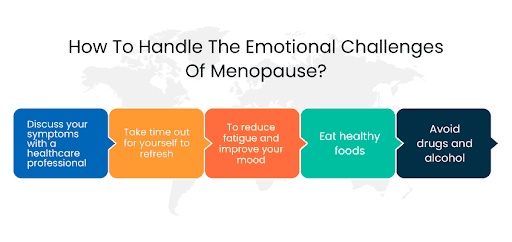Introduction
Menopause is a woman’s cessation of menstrual cycles (periods). Though menstruation is a natural, biological process, physical, emotional, and mental symptoms often accompany it. Challenges arise when you find it difficult to manage them. However, getting the necessary knowledge and support will make it easier to overcome these challenges. This article will describe the emotional challenges during menopause and how to deal with them.
Our Wellness Programs
What is Menopause?
Menopause is a time when a woman stops having her menstrual cycles. It is a natural part of ageing. It usually occurs between the ages of 40 and 50 years. You are said to have achieved menopause if you have gone without a menstrual cycle for more than a year. Surgical menopause may occur if you have had surgery to remove your ovaries. Your ovaries are vital female reproductive organs that help store eggs and release them into the fallopian tube for fertilisation. The ovaries also produce the hormones oestrogen and progesterone, which are vital in controlling menstruation. During menopause, your ovaries start making less of the hormone oestrogen. It results in the cessation of your periods. Your body may adapt in different ways due to this hormonal change. You may face depression, anxiety, or a roller coaster of emotions ranging from joy to frustration to annoyance within the blink of an eye. Physical symptoms like hot flushes and specific emotional challenges during menopause can also affect your sleep quality and emotional health. These hormonal changes can also affect your mood and make you feel depressed. Various treatments are available to deal with the challenges faced during menopause. These treatments vary from lifestyle adjustments to hormone replacement therapies (H.R.T.s).
Looking for services related to this subject? Get in touch with these experts today!!
Experts

Banani Das Dhar

India
Wellness Expert
Experience: 7 years

Devika Gupta

India
Wellness Expert
Experience: 4 years

Trupti Rakesh valotia

India
Wellness Expert
Experience: 3 years

Sarvjeet Kumar Yadav

India
Wellness Expert
Experience: 15 years

Shubham Baliyan

India
Wellness Expert
Experience: 2 years

Neeru Dahiya

India
Wellness Expert
Experience: 12 years
What Emotional Challenges Do Women Face During Menopause?
As listed below, women face various emotional challenges during menopause due to decreasing oestrogen levels.
- Irritability
- Loss of energy
- Lack of sleep
- Anxiety
- Aggressiveness
- Tension
- Feelings of sadness
- Lack of motivation
- Difficulty in focusing and concentrating
- Mood changes
Other than these, hot flashes and night sweats can affect sleep quality, affecting one’s mood. It can cause depression and affect sleep quality. Hot flashes may also cause anxiety attacks.
Common emotional challenges during menopause include depression, mood swings, anxiety or panic seizures, short temper, impatience, or crying. These can be challenging as they can impact one’s life and those around.
Moreover, menopause is a time that may coincide with the end or start of a romantic relationship. In addition, children leaving home, career changes, health changes in you or your partner, increased responsibilities; and changes in one’s life expectations can further enhance the emotional challenges faced during menopause.
What Are The Effects Of The Emotional Challenges Of Menopause In Daily Life?
The effects of emotional challenges of menopause can affect one’s daily life by impacting those around them. Depression, mood swings, and irritability may affect your relationship with your spouse and children. You may blow things out of proportion, leading to a tense environment at home.
Other challenges during this stage of life, like worries about children’s future, relationship difficulties, bereavement, work pressures, and so on, may increase the stress and strain of the emotional challenges faced during menopause.
Controlling one’s emotional upheaval during menopause may lead to mental and physical exhaustion. These dynamic challenges during menopause become difficult to deal with within the workplace and affect your work-life if not treated. Due to anxiety, loss of confidence, difficulty concentrating, and mood swings, one may lose faith in the workplace, affecting one’s quality of work. Your coworkers may avoid you if you continue to be aggressive, irritable, and snappy.
Overall, these emotional challenges during menopause can affect your quality of life if not treated.
How To Handle The Emotional Challenges Of Menopause?

To handle the emotional challenges of menopause, you need to make specific lifestyle changes by learning to relax and reduce your stress. The following tips can help you take the emotional challenges of menopause.
- Discuss your symptoms with a healthcare professional, a friend, or a family member.
- Keep a diary of your menopausal symptoms to help you understand the emotional symptoms that you are experiencing.
- Take time out for yourself to refresh and nurture yourself.
- To reduce fatigue and improve your mood, try and get quality rest.
- Exercising can help improve your mood and your physical health.
- Eat healthy foods.
- Find activities that calm you, like meditation, yoga, or rhythmic breathing.
- Find activities that help create a sense of achievement.
- Nurture your relationships.
- Stay connected with your family and community.
- Avoid drugs and alcohol.
- Seek support from other women in your community or a healthcare professional.
Another self-management technique to help you handle the emotional challenges of menopause is cognitive behavioural therapy (C.B.T.). C.B.T. uses relaxation and rhythmic breathing to help ease anxiety and other emotional symptoms. In addition, mindfulness training that lets you focus on the present moment can help reduce stress, anxiety, and depression. These therapies, medications, H.R.T., counselling, or psychotherapy can help you handle the emotional challenges during menopause.
Conclusion
Although you cannot evade menopause, you can treat and manage the suffering in terms of emotional challenges during menopause with it. Addressing these emotional challenges during menopause can make one resilient and in a better mental state mentally to cope with them. Calming yourself, relaxing, and getting support will help you reduce the impact of these emotional challenges during menopause on your daily life.
Though mood swings and anxiety can be debilitating, getting the help and support you need will help you manage these emotional challenges during menopause. Treatments like lifestyle changes, C.B.T., mindfulness, relaxation, medications, and H.R.T. can help you deal with these emotional challenges during menopause.
Do not let this phase of menopause get the better of you. Knowledge is power, and so is the will to act and get support. If you are concerned about your emotional changes, do not hesitate to contact your healthcare professional for advice.















